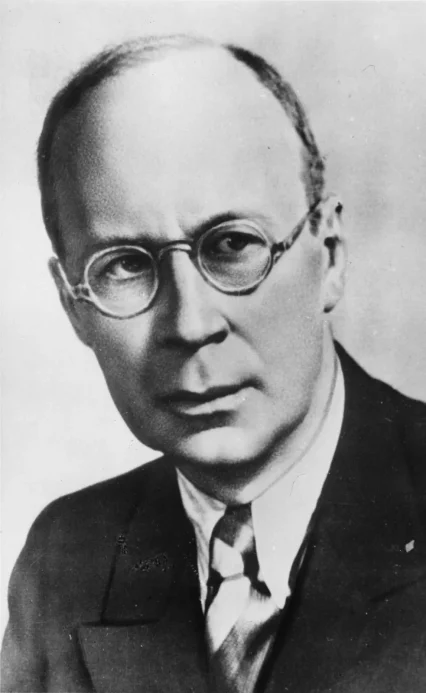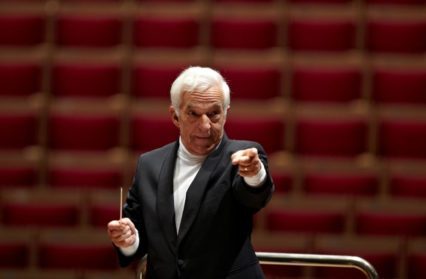Nigel Jarrett is at St David’s Hall, Cardiff, for a performance of Sergei Prokofiev’s Cantata for the 20th Anniversary of the October Revolution, performed by the Philharmonia Orchestra conducted by Vladimir Ashkenazy.
Sergei Prokofiev’s elephantine commemoration of the Bolshevik uprising of 1917 is sound and fury signifying something. Quite what the Cantata for the 20th Anniversary of the October Revolution signifies might range from the reason why the Commissars should never have been allowed within ten miles of a musical score to how far a Soviet composer could go to take advantage of their stupidity. As the forces required to dispatch this lumpen rhetoric trooped on to the platform – they included an accordion band, a male chorister shouting words through a loud hailer, a separate brass ensemble as well as a full orchestra and two choirs – one wondered what Prokofiev, newly returned to the Soviet Union in 1936 after an unsuccessful sojourn in America, was thinking about.
He must have been thinking what might happen to him if the dumbwit taste makers took against a performance of his Cantata in the same way as they had denounced fellow composer Shostakovitch’s opera Lady Macbeth of Mtsensk. As it was, they didn’t like the way Prokofiev had commandeered the words of Stalin, Marx, and Engels – ‘the voices of the workers’ – and set them to such inhospitable music. Poor old Shosty: he’d tried, it is alleged, to answer the call for the kind of uplifting music the proles could understand, only to be rejected.
In the Soviet Union of the 1930s, rejection meant drawing the ire of Joe Stalin, who continued to transform his country for the better only to smudge his copybook with the unexplained disappearance of around 600,000 individuals considered a threat to both the system ushered in by the revolution and his own power base.

Listening to the Cantata today is akin to being not only shouted at but shouted down. It’s the accompaniment to a political philosophy that brooks no demur. In many ways, admittedly with hindsight, the experience is chilling. Fearful of Shostakovitchian reproof, or worse, Prokofiev withdrew the Cantata and never heard it performed during his lifetime. He probably didn’t mind.
In 1966 it was resurrected, though by then Stalin was yesterday’s man and any suggestion, in music or elsewhere, that he was avuncular and benign could lead to trouble from a new gang of Kremlin toughs, who might have seen too much in it that was insufficiently critical of their demoted demigod. So some parts considered suspect in that regard were cut. As it was, commentators detected ambivalence in the music when it was supposed to be approving, in the same way that Shostakovitch’s optimism could be read as veiled criticism.
Those risibly-sounding organisations, the Russian Association of Proletariat Composers and the superseding Union of Soviet Composers, seem as though they were men wearing the jackets and trousers from unmatching suits, and with their underwear in a twist. Their naked eyes could spot microbes in a jug of milk. Why, apart from its jollity or dangerous lack of it, did they think music could be such a pervasive influence? Perhaps it’s to music’s credit that they did. Today, Russian music has only to redound to Russia’s credit for Putin and those like him to sanction it. Beside them, a composer is simply a harmless non-entity, unable to influence matters of State.
The Soviet authorities claimed astonishing powers in being able to detect the subversive in music; in criticising it for its modernity and ‘chaos’ they were simply being conservative, like their descendants and all reactionaries of all time. So, divested of historical predicates, the Cantata today would be a curate’s egg if it were not mostly, rather than partly, bad. Without pressure from some proletarian critics’ circle, an independent, untrammeled Prokofiev would probably never have written it in the first place.
It’s not difficult to make the ten-part Cantata sound impressive. It has its moments but they are mostly orchestral. A further paradox in the text was the inclusion of Stalin’s words on the death of Lenin and his hopes, in the final Constitution, for the furtherance of Communism, for they turn out to be some of the less irksome parts of the work. In 1966, of course, they had to be removed. The Victory section, which quotes Lenin on ‘hunger, typhus, and devastation’ can never be gainsaid. Conductor Vladimir Ashkenazy just let it all roll downhill with minimal guidance, in a couple of places probably aware that the choir was threatening to come adrift. Everyone was cheered to the echo, not least the two chorus-masters, Aidan Oliver, who also shouted Lenin’s words through the hailer, and David Temple (Crouch End).
Beside Sergei Prokofiev’s Cantata, his First Violin Concerto would for many stand as an emblem of all that is glorious about Russian music, though at the time of its appearance it too had its critics. Its al fresco joy was relayed here by the Finnish violinist Pekka Kuusisto, who encapsulated in hushed tones a Spring-like tenderness, sometimes so softly that a concert hall seemed too cavernous a place for it to expand. This applied even to the quick central movement and to the orchestral accompaniments, everywhere supportive, especially in underpinning the violin’s luminous, scintillating effects. Kuusisto is the coming fiddler, with strong ideas about the repertoire and how it should be played – this concerto, for instance, to be performed as though, like Mendelssohn’s first, the instrument were just waiting to slip into the music, hand in glove. His encore was an equally whispered improvisation on Podmoskovnye vechera (Midnight in Moscow).
Autumnal, the sketch that opened this all-Prokofiev programme, bore the imperial stamp of the Philharmonia. It expresses the struggle Sergei Prokofiev always engaged in to reconcile the new and the old, the emotional and the cerebral. He was ever aware of the concerns that exercised the Politburo’s cultural committees to distraction.
Sergei Prokofiev: Autumnal; Violin Concerto No. 1 in D; Cantata for the 20th Anniversary of the October Revolution
Philharmonia Orchestra; Crouch End Festival Chorus; Philharmonia Voices; Musicians from the Royal Welsh College of Music & Drama (military band); Students of the Royal Academy of Music (accordion ensemble); Pekka Kuusisto (violin).
Conductor: Vladimir Ashkenazy
St. David’s Hall, Cardiff, 18 May 2018.
Nigel Jarrett writes and reviews for Jazz Journal magazine, and contributes a column called ‘Count Me In’. Based in Monmouthshire, he also writes on many subjects for Wales Arts Review. He is the winner of the Rhys Davies Prize and the Templar Shorts Prize for short fiction, and the author of three books of stories, a poetry collection, and a novel. In the last year, he has completed a second novel-type work of fiction, a second poetry collection, and a fourth collection of stories.



 Enjoyed this article? Support our writers directly by buying them a coffee and clicking this link.
Enjoyed this article? Support our writers directly by buying them a coffee and clicking this link.







